Phencyclidine (PCP): Symptoms, Treatment, & Effects of Angel Dust
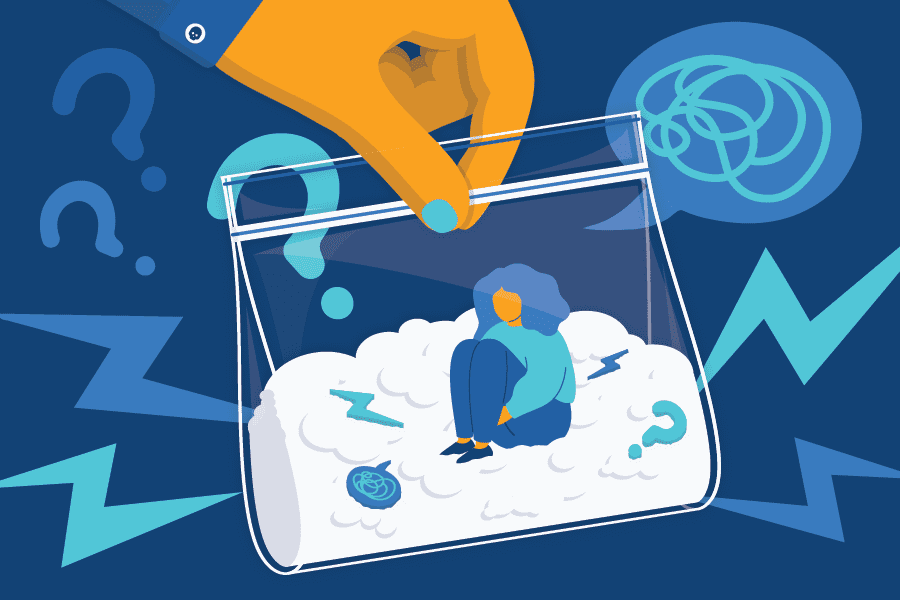

Phencyclidine, or PCP, is a hallucinogen that alters the perception of the person ingesting it. Originally developed in the 1950s as an anesthetic, PCP was discontinued for human medical use after causing frequent serious neurotoxic side effects.
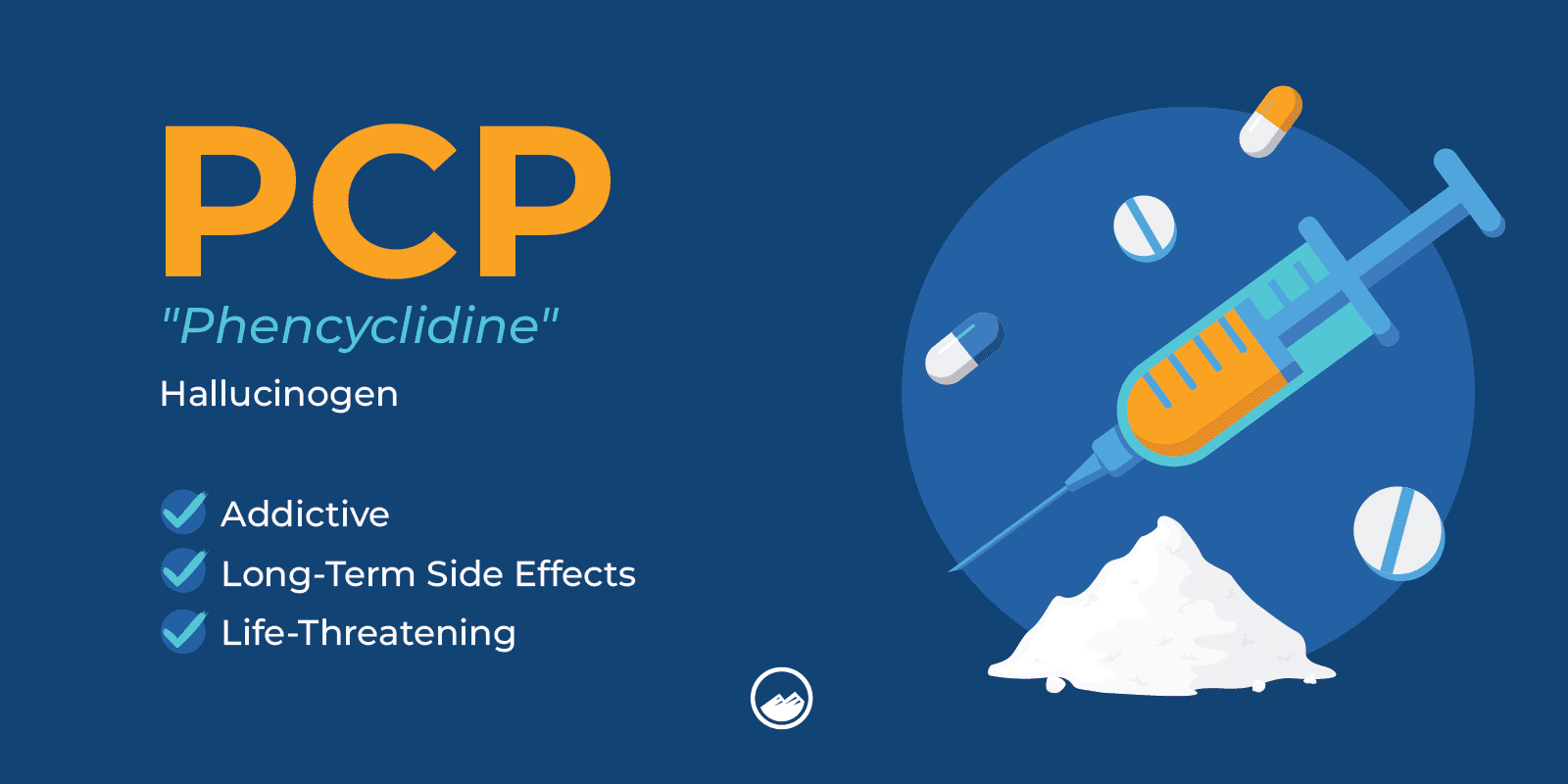
Those looking to use PCP recreationally do so to obtain its mind-altering effects. In its purest form, PCP is a white, crystalline powder that’s ingested in a variety of ways. The powder can be converted into tablets or capsules, smoked, snorted, or dissolved into alcohol. There is a bitter chemical taste associated with this substance.
Phencyclidine is a hazardous drug that can result in long-term damage and can become life-threatening.
PCP is especially dangerous when people go on binges of drug use. This can involve a person taking PCP several times, two to three days at a time, with no sleep or eating.
Someone who goes on a binge of high doses can face severe body and brain damage or accidentally hurt themselves.
PCP is illegal and a Schedule II substance, meaning it has a high potential for abuse and can lead to severe psychological or physical dependence.
According to Forensic Science Review, PCP has stimulant, depressant, hallucinogenic, and analgesic effects.
The effects individuals experience can depend on various factors, such as their personality, psychological state, or environment.
PCP may go by other terms, or “street names,” that can include:
Illicit drugs often have appealing street names to catch the attention of younger users or to get more people to want to try them.
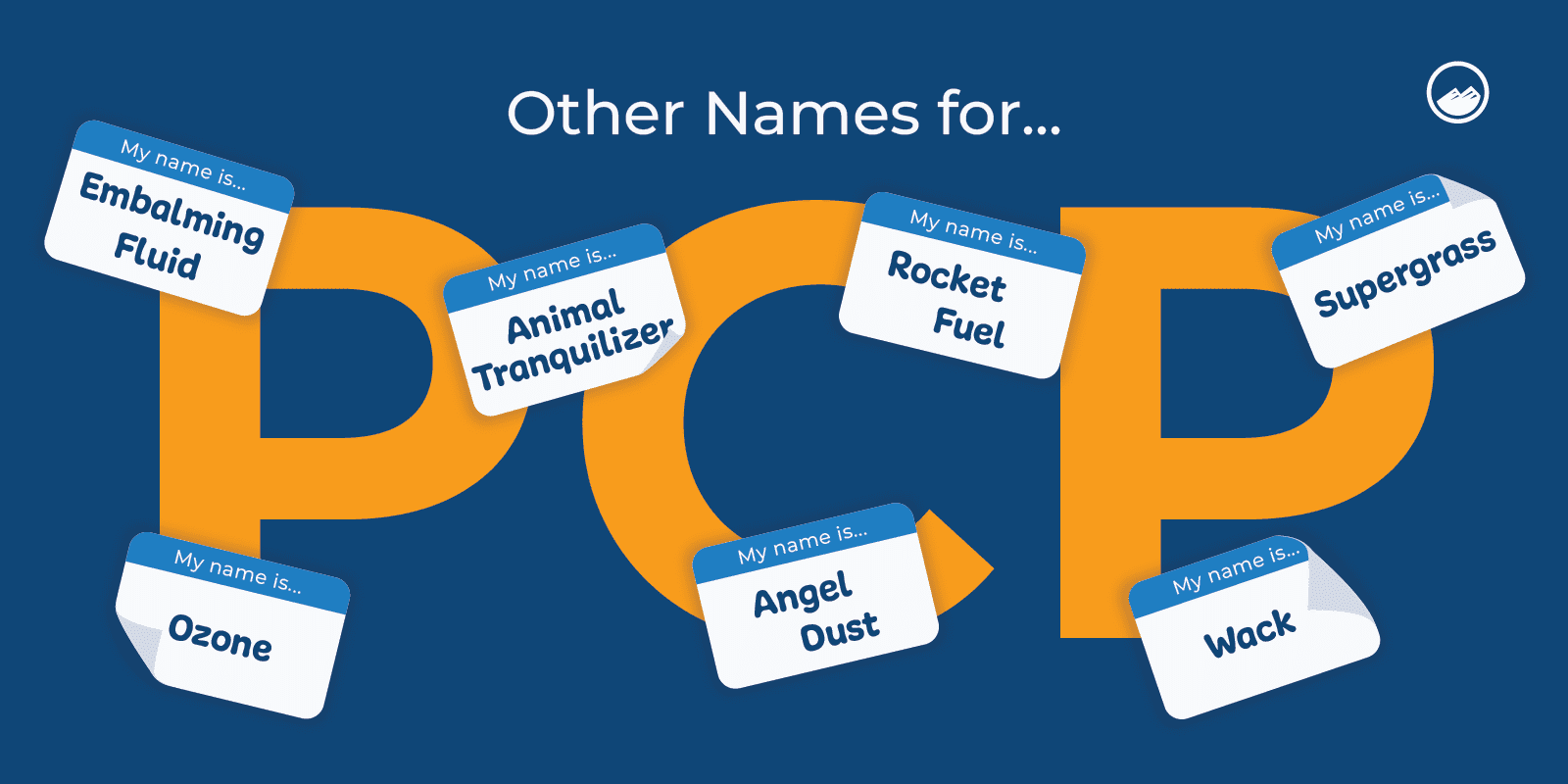
Angel dust is a white crystalline powder that dissolves in water or alcohol.
PCP can also be found in tablet or capsule form. Sometimes, it is also added to leafy substances like oregano, mint, or marijuana and smoked.
In some cases, PCP may have contaminants that change its color to tan or brown.
PCP may be taken in different ways, which can include:
Depending on how high a dose a person takes and how it was taken, its effects can be felt within two to five minutes and may last anywhere from six to 24 hours.
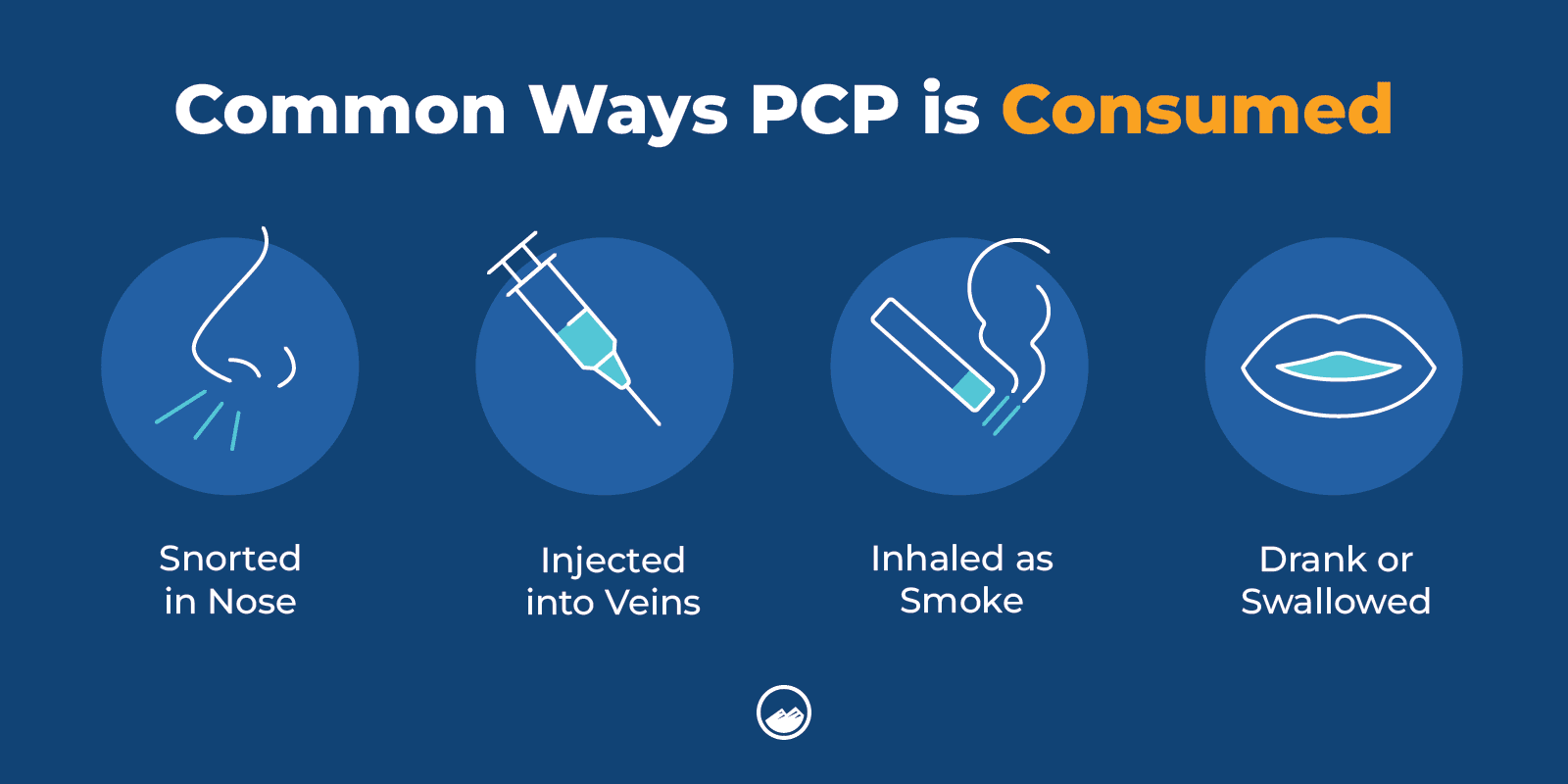
One way that PCP is commonly used is by dipping tobacco or marijuana cigarettes in PCP and smoking them.
If PCP is mixed with other substances, like alcohol or depressants, it can put the individual at risk of coma or become life-threatening.
According to the CBHSQ Report, about half of the PCP-related emergency department visits in 2011 involved PCP combined with other substances such as cocaine, marijuana, and heroin.
According to justice.gov, although PCP is used among people of all ages, PCP use among high school students is specifically concerning.
Surveys show that 225,000 individuals ages 12 to 17 and 777,000 individuals ages 18 to 25 reported using PCP at least once.
PCP use among young people is extremely dangerous as they are more vulnerable to facing long-term damage and developing an addiction.
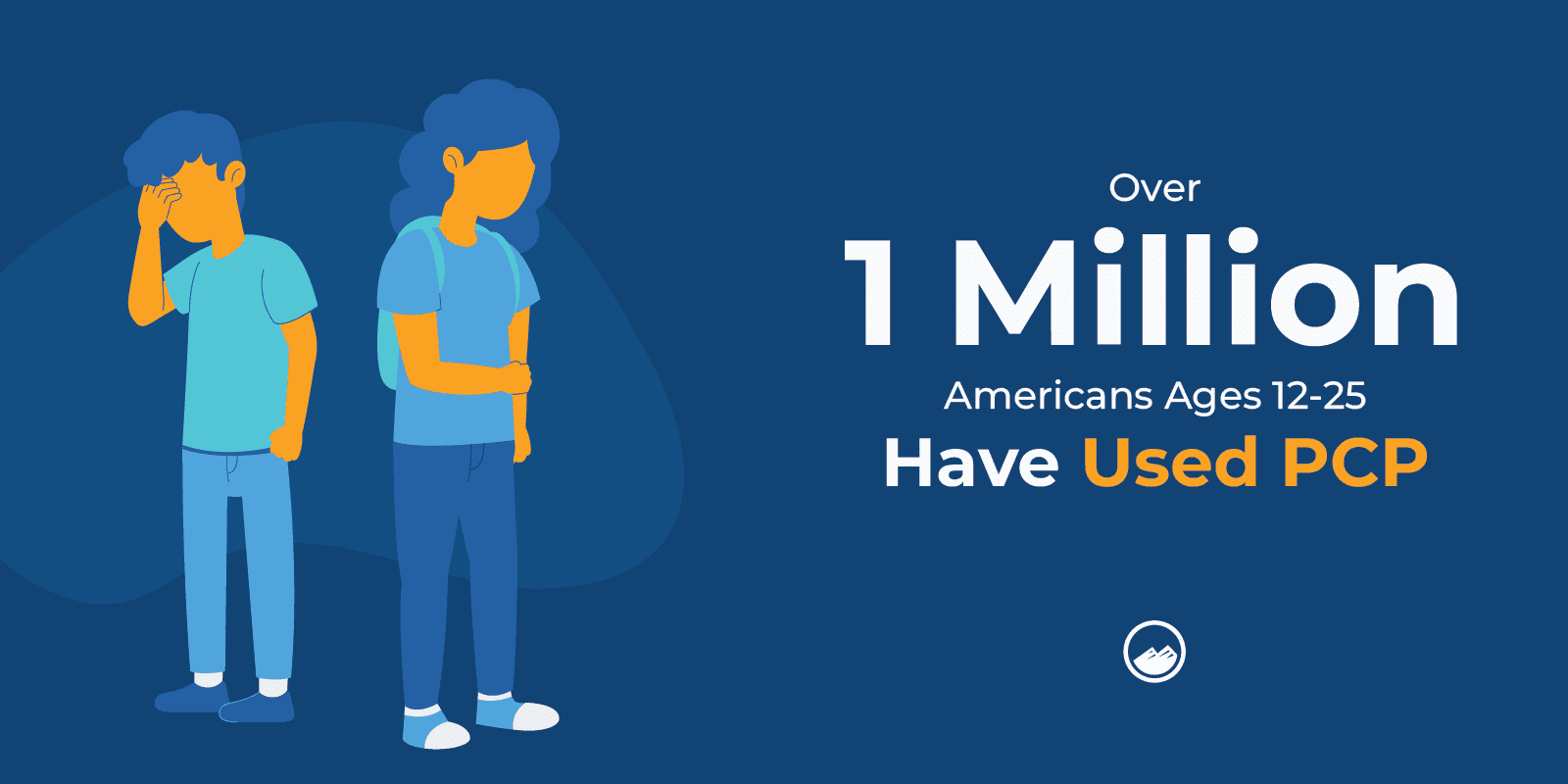
According to MedlinePlus, a person who uses PCP can become psychologically and physically addicted to it.
A person can quickly become dependent on PCP and lose control over their use.
Those who abuse PCP may also develop a tolerance, where they need more and more of the substance to achieve the same high. If they stop using, they will face withdrawal symptoms.
Any illegal substance that is chemically engineered carries high risks for adverse effects because of how it’s made. There’s no way of knowing how potent the substance is or what its exact chemical makeup is – users are essentially putting their well-being into illicit manufacturers’ hands.
Often, chemicals typically used to create PCP are substituted with others that are less expensive or found in household products. This variance and lack of consistency can create a multitude of problems for anyone who ingests these substances.
Short-term risks associated with recreational PCP use include:
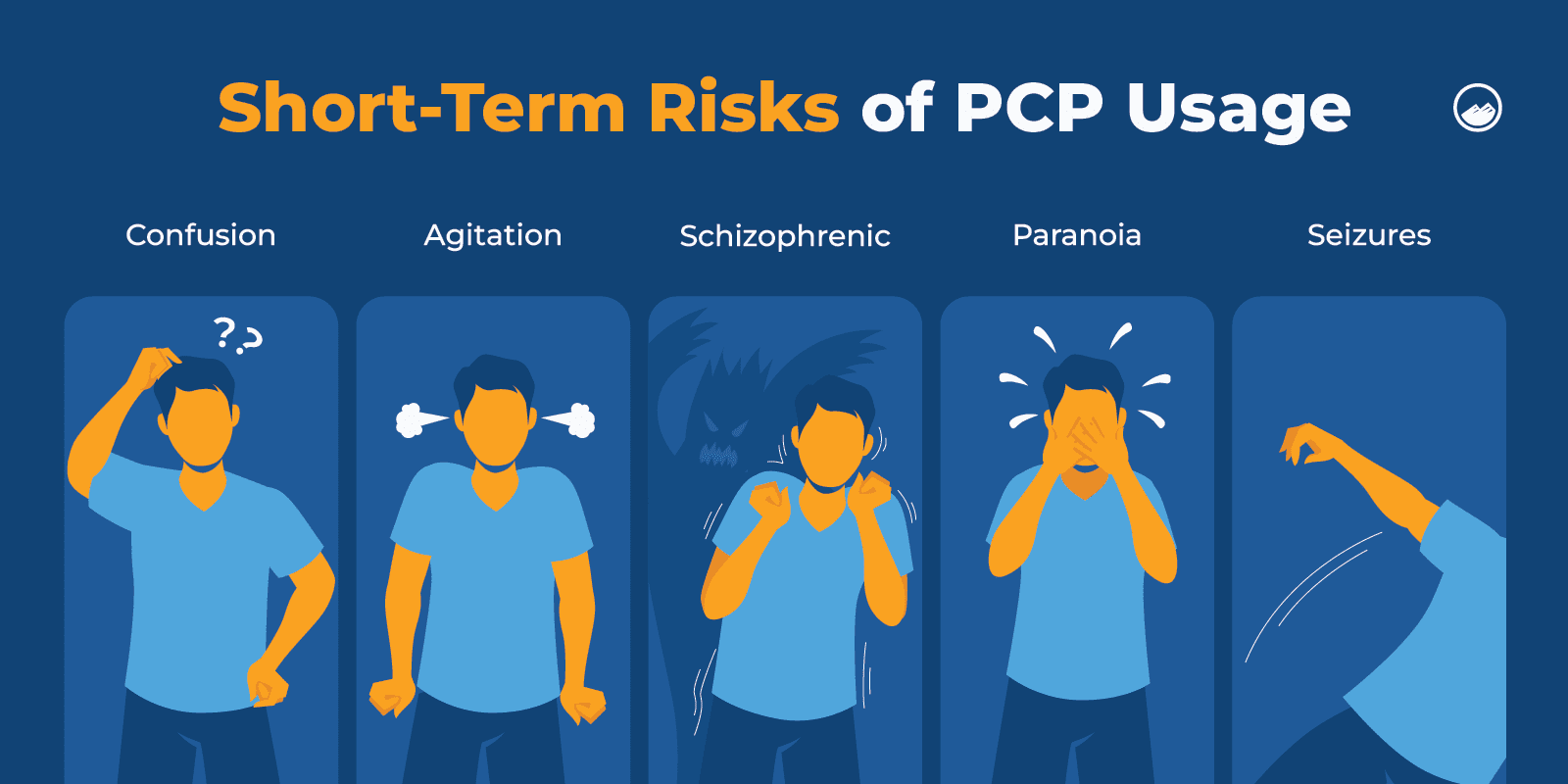
A common problem hospitals encounter is that people using PCP are brought to emergency rooms because its powerful effects have caused them bodily harm. Due to the numbness, dissociation, and feelings of invincibility this drug causes, users often put themselves in dangerous situations without realizing how much damage they’ve incurred.
On some occasions, PCP use has resulted in extremely violent behavior and suicide.
PCP is also addictive. According to the National Institute on Drug Abuse, repeated abuse of PCP can lead to dependence and compulsive drug-seeking behavior.
The effects of PCP vary from person to person and also depend on the dosage ingested. Someone who takes a low dosage will generally experience feelings of euphoria, numbness, sensory distortions, detachment from one’s own body, and some hallucinations.
PCP works by preventing a neurotransmitter called glutamate from attaching to its receptor. By also disrupting the typical actions of other neurotransmitters in the brain, dissociative effects can be expected. Feelings of invulnerability and floating, are what people most commonly seek when using this substance.
Some side effects of PCP use can include:
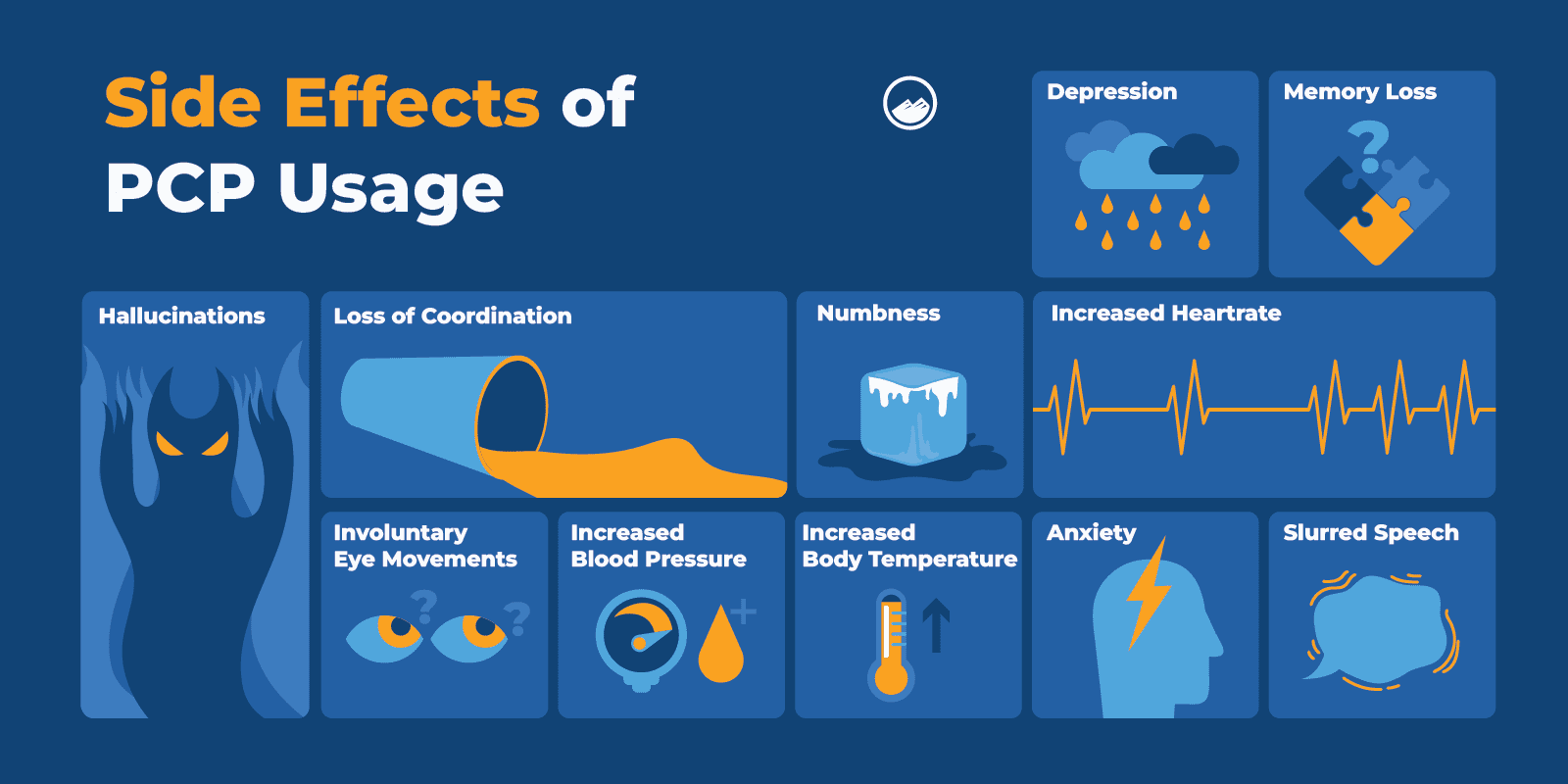
Additionally, PCP has pain-killing properties, which means that if a person seriously injures themselves, they may not feel pain, and a severe problem may go untreated and worsen.
PCP is known for distorting a person’s sense of reality. PCP users often fall under a false sense of power and invincibility, which can become very dangerous.
Intoxication of PCP at a low or moderate dose can still put a person in a confused state and affect both their brain and body. Some who take PCP in higher doses can experience severe neurological and cardiovascular complications.
PCP acts on the central nervous system and changes a person’s mood, behavior, and how they relate to the world.
Scientists suggest that PCP blocks the normal actions of specific brain chemicals.
It is believed that PCP works by preventing the neurotransmitter glutamate from attaching to its receptor. PCP can also affect the actions of other brain neurotransmitters, creating dissociative effects.
PCP is known as a hallucinogen and dissociative drug. This means that it can cause users to hear or see things that aren’t there. It can also make a person feel separate or disconnected from their body.
Young people may use PCP as a way to achieve a “high” or a sense of “euphoria.” PCP can make a person feel like they are floating or disconnected from reality. Because of these effects, a person may use PCP as an escape or an unhealthy coping mechanism for difficult thoughts.
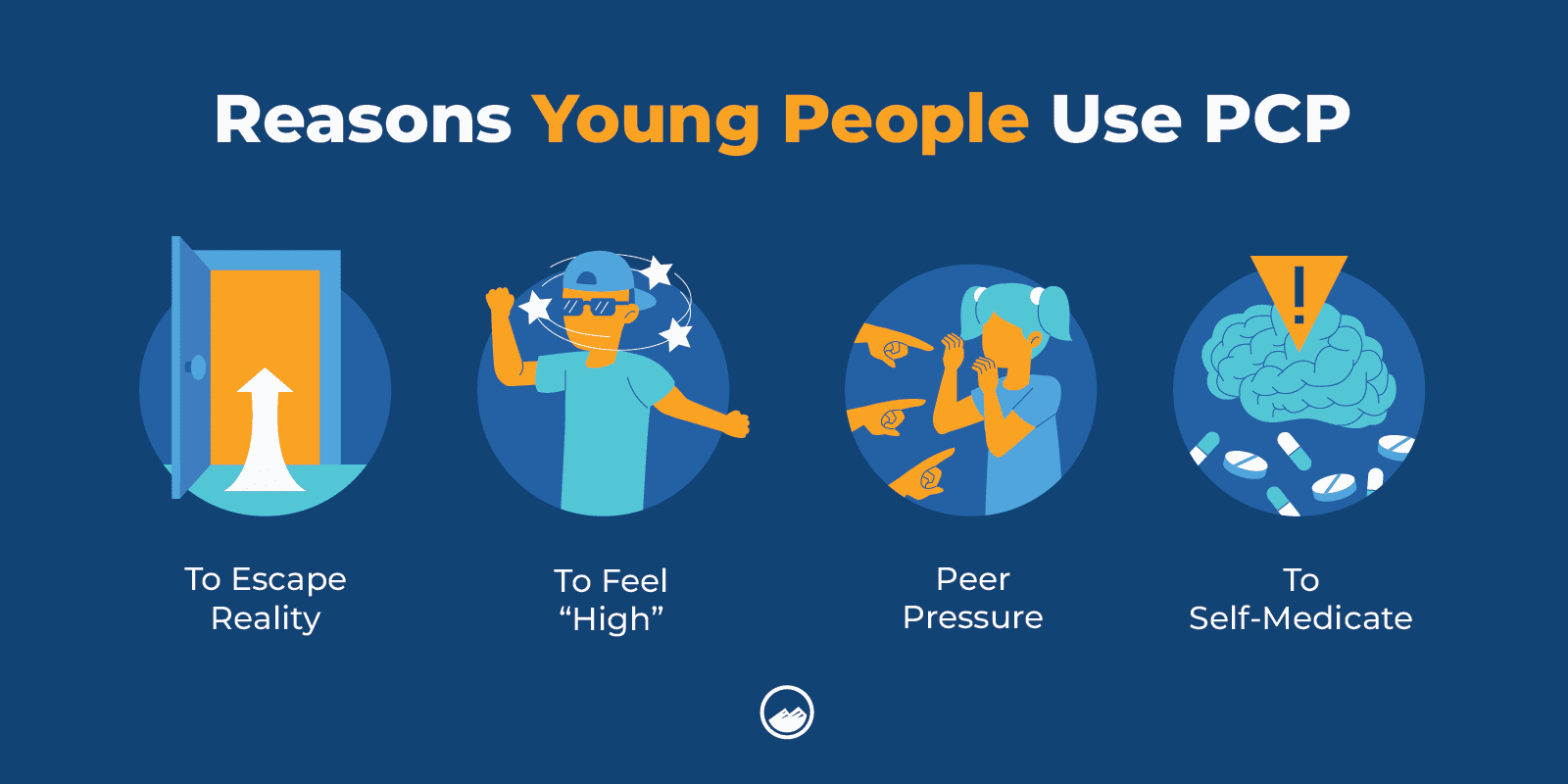
Phencyclidine can also affect a person’s sense of thinking. They may feel that they have superhuman strength and do not fear anything. Not only does this affect the brain, but it can put someone at a higher risk of becoming injured and not getting proper treatment.
People who use PCP may commonly mix it with other drugs or alcohol.
However, doing so is extremely dangerous and can put a person in a coma or lead to an accidental overdose.
Mixing PCP with other substances can result in life-threatening consequences.
Risk factors can impact drug abuse and addiction in a variety of ways.
Some risk factors of PCP addiction may include:
PCP abuse and addiction can cause long-term problems in a person’s brain.
It can affect a person’s memory, concentration, perception, and judgment.
PCP can also trigger psychosis, even when a person stops using it. Psychosis refers to conditions that affect the mind, where a person loses contact with reality. A person experiencing psychosis can have trouble determining what is real and what is not.
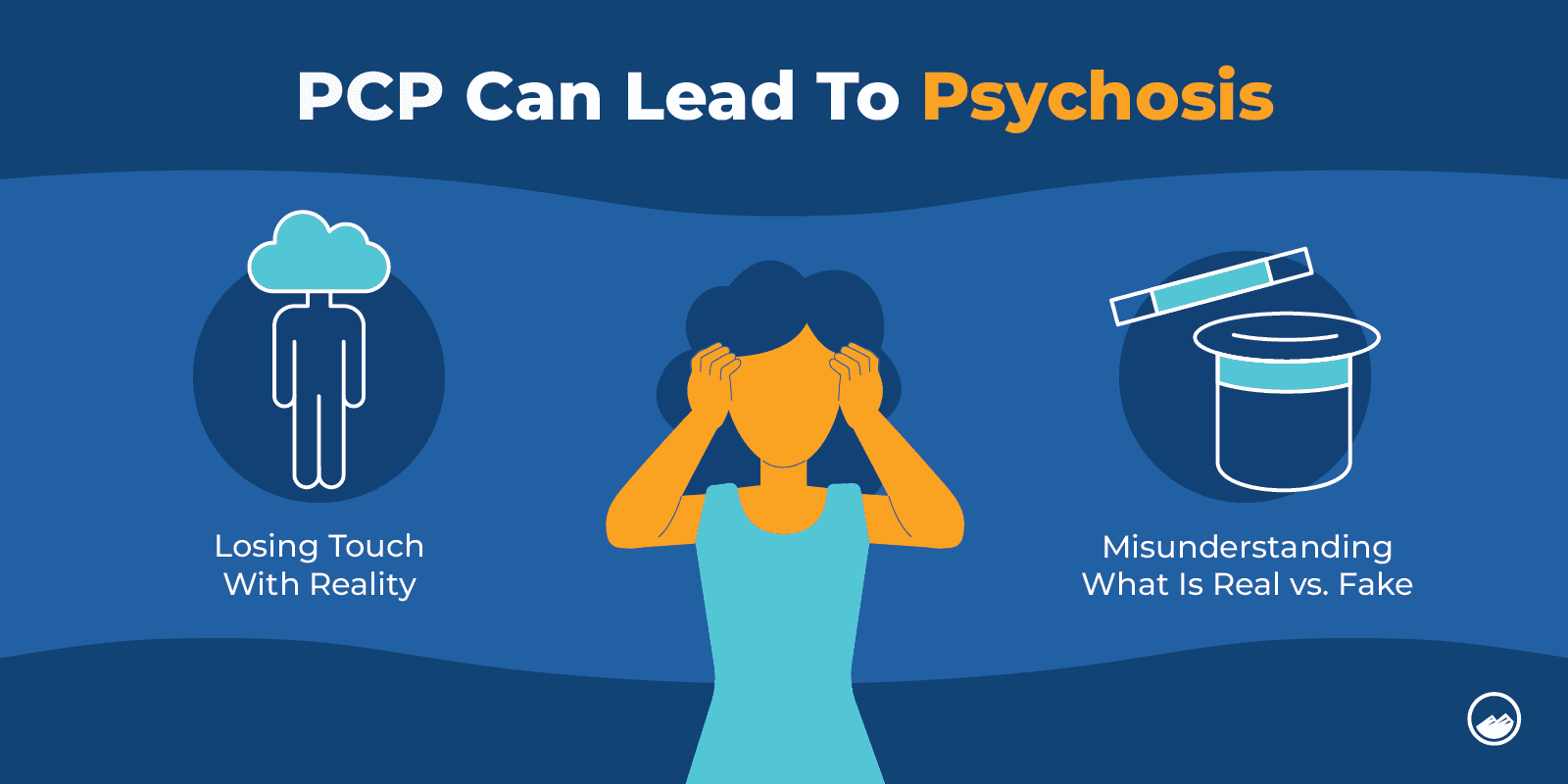
Long-term PCP use may also result in speech problems and slurred speech, likely related to the impact it has on one’s cognitive functions.
Taking PCP in large doses or over long periods can also result in kidney failure, heart arrhythmias, seizures, and in some cases, can be fatal.
Symptoms of phencyclidine abuse can include:
If you or a loved one are experiencing suicidal thoughts, seek help immediately. You can call the National Suicide Prevention Lifeline at 988 or 911.
According to the Journal of Psychology, PCP may induce symptoms that are similar to schizophrenia, which can include symptoms of delusions and paranoia.
Delusions are beliefs that are false or are not based on reality.
Paranoia refers to a thought process that causes a person to feel that they are threatened or have an irrational mistrust of others.
PCP’s effects can include many psychological effects including flashbacks and hallucinations.
PCP can be applied to other more common drugs like tobacco or marijuana and smoked, making it seem less serious than it is.
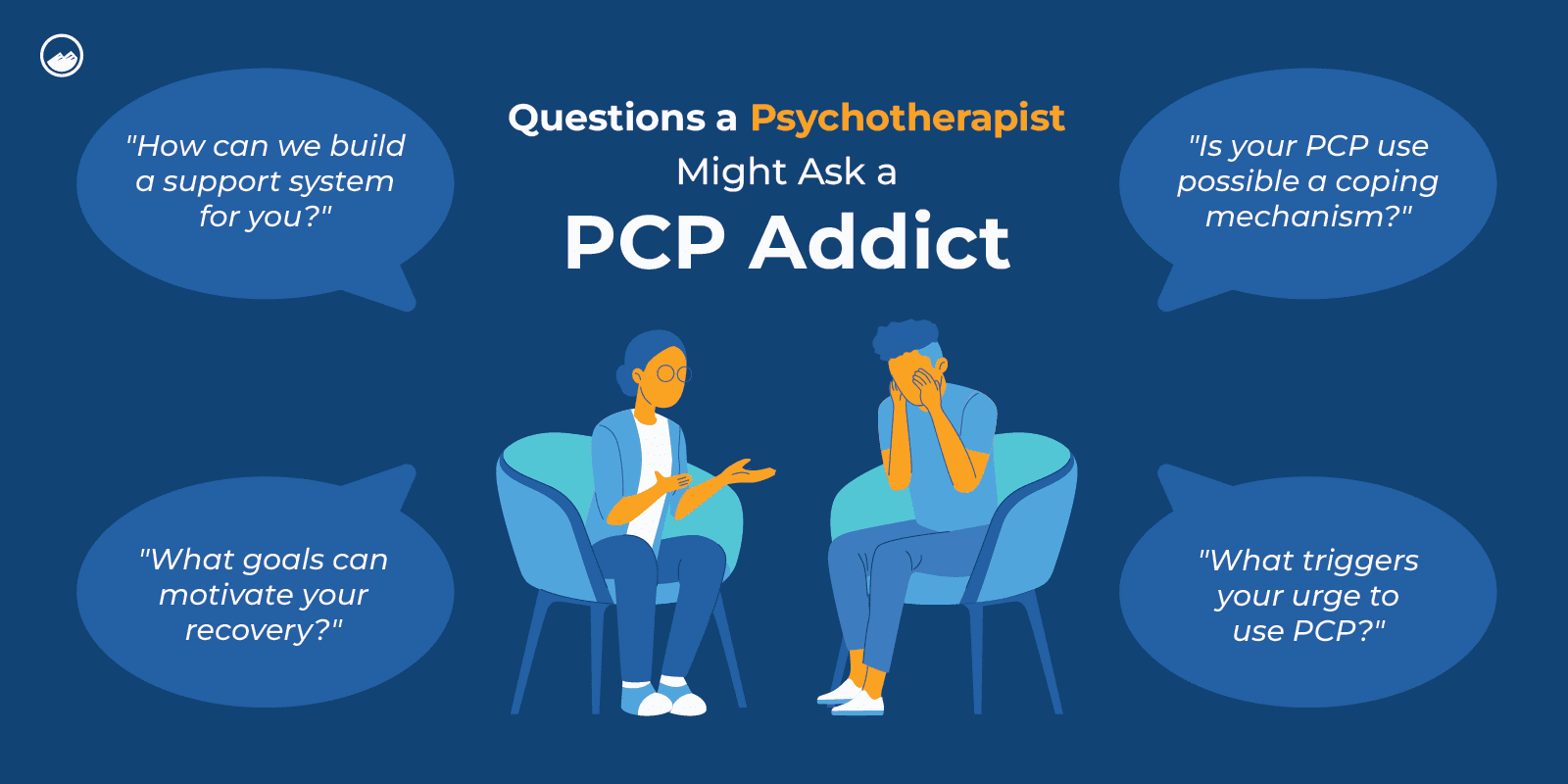
Signs that a person may be addicted to PCP can include:
Some paraphernalia that can be associated with PCP use that you can look out for may include:
If you believe a loved one is struggling with PCP addiction, it is essential to reach out to a healthcare professional who can offer a proper diagnosis and expert care.

Yes, an overdose occurs when a person takes more than the normal or recommended amount of a drug.
Symptoms of a PCP overdose can include:
If you suspect a person is experiencing an overdose, seek medical help immediately and call 911.
Treatment for PCP abuse usually involves psychotherapy or talk therapy that uses behavior change techniques.
Psychotherapy can help a person identify unhealthy thoughts and feelings and how they lead to destructive behaviors.
A common form of psychotherapy is cognitive-behavioral therapy (CBT). CBT is an umbrella term that refers to various therapeutic approaches used for treating mental health disorders, substance use disorders, and addiction.
There is no current medication that can help reduce the use of PCP by blocking its effects.
Support groups can also be helpful for individuals struggling with addiction because it helps build a strong support network. Through group therapy, individuals can learn from one another and relate to people who may share similar experiences with them.
SAMHSA has a behavioral health treatment services locator that serves as a confidential and anonymous source of information for people seeking mental health and substance abuse/addiction treatment.
It is important to find a treatment center and treatment team that work best for your needs. PCP addiction treatment is not a one-size-fits-all approach.
You will also want to find a center that offers age-specific, individualized treatment plans to help you and your loved ones through treatment and recovery.
Angel dust addiction is typically treated with some form of psychotherapy.
Psychotherapy, or talk therapy, can help an individual understand the connection between their thoughts, feelings, and behaviors.

Through psychotherapy, a person can learn how to restructure their thoughts in a more positive, realistic way to help them build healthy coping mechanisms.
If a person struggles with withdrawal symptoms from PCP, medicines may help them manage their symptoms and safely detox from the substance.
Someone struggling with severe angel dust addiction may consider inpatient treatment. Inpatient treatment or residential care involves 24-hour support for those who require a high level of structure and supervision.
A person experiencing mild to moderate symptoms may benefit from a day treatment program or intensive outpatient program (IOP). In day treatment, individuals can still live at home but receive a high level of structure and support at a treatment facility during the day.
Yes, a person who suddenly stops or significantly decreases PCP use may experience withdrawal symptoms that can include:
It is essential for someone who is experiencing withdrawal from PCP to seek medical help.
Withdrawal symptoms can become dangerous, and medically supervised detox can help a person manage withdrawal symptoms in a safe and controlled setting.


Phencyclidine (PCP) is a dangerous, illicit drug that can cause a person to experience hallucinations and detachment from reality. Sandstone Care is here to support teens and young adults struggling with mental health and substance use disorders.